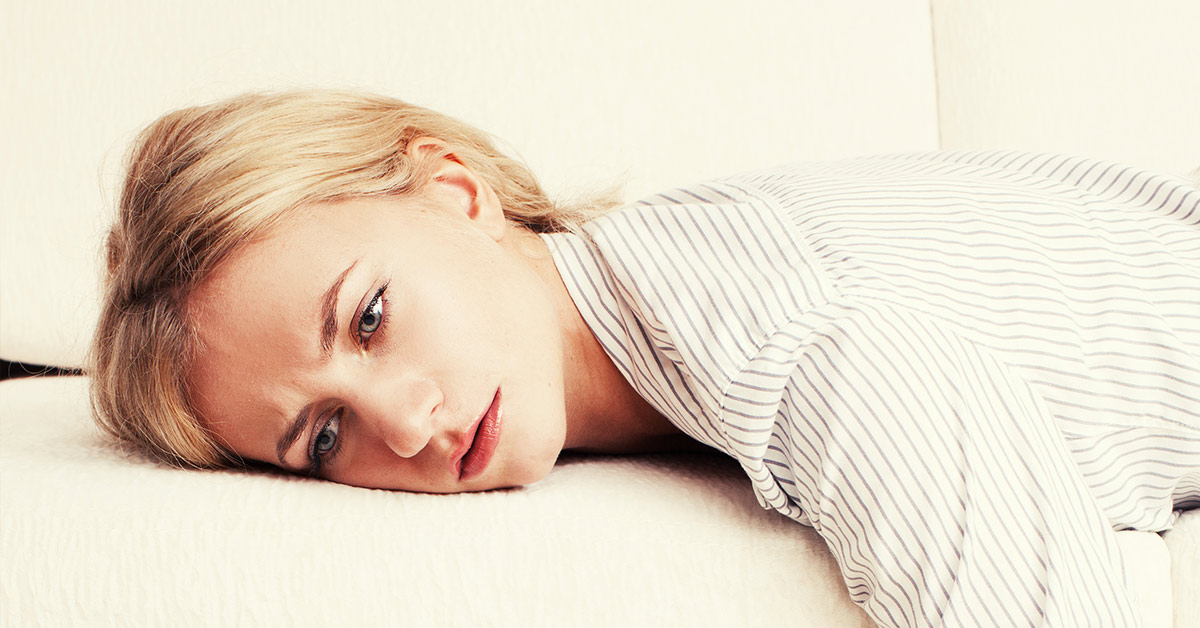When you go through a challenging period in your life, you often feel the effects physically. Whether it’s pain, fatigue, or both, you feel like you’re just sort of dragging yourself through life. This is what we call soul exhaustion: You’ve been through a lot, and your spirit is depleted. This is what soul exhaustion feels like and what you can do about it. (1)
15 Signs of Soul Exhaustion
When your soul is tired, you feel it your whole body, both physically and mentally. Before we dive into the signs of soul exhaustion, however, it is important to note that there is a difference between depression and other mental health illnesses. I will touch more on those later, however, I want to state clearly at the beginning if you are dealing with deeper mental health issues it is imperative that you seek the help of a professional. (2)
So, is your soul exhausted or are you just tired? Let’s dive in.
1. You Feel Physically Exhausted
Emotional exhaustion often manifests itself as physical exhaustion. When you are going through challenging times, often things like simply getting yourself ready for the day or just showing up to work with a smile on your face require a lot more energy. (1)
Often you will sleep more: Go to bed earlier, get up later, perhaps take naps throughout the day. At the very least, you will want to. Despite this, you still feel tired. Other times, you may find yourself feeling tired but unable to turn your brain off and go to sleep. This will also affect how much energy you have during the day.
Again, please remember that emotional pain can manifest itself as physical exhaustion and be a symptom of clinical depression. If this continues for long periods of time, seek professional guidance. (2)
2. You Can’t Explain Your Emotions
One of the hardest parts about difficult periods is trying to put into words how you are feeling. When your soul is exhausted, determining the right words to match how you are feeling can feel impossible. When someone asks how you are feeling, it’s impossible to say. Are you angry? Sad? Frustrated? All of the above? Likely, you’ll end up answering with “I don’t know, I’m just tired.” (1)
As always, a professional mental health counselor or therapist can help you put words (aka meaning) to your feelings. From there, you can work through them together.
3. You Feel Numb or Empty
After the initial waves of grief and intense emotion crash through you, you may be left feeling rather numb. You’re stuck in this empty, emotionless space where you simply feel void of feeling. While this may temporarily block out some of the bad emotions, it also prevents you from feeling happiness and joy. It’s like being stuck in a permanently grey day. (1)
4. You Can’t Laugh Anymore
Remember the last time you laughed? Maybe a small chuckle at your favorite sitcom, or maybe a long, deep belly laugh with friends – the kind that makes your stomach hurt. If your soul is exhausted, chances are it has been a while. Now, laughing may feel impossible, or at least it requires a lot of effort to fake. (1)
This is normal immediately after a tragic event, however, if you find this continuing for months on end, it could be the sign of a deeper struggle.
5. You Don’t Feel Like You
When your soul is exhausted, you don’t recognize yourself in the mirror anymore. You look at old photos or videos of yourself, and that laughing, joyous person seems like a distant memory.
The thing is, grief, trauma, and life challenges do change a person. However, it doesn’t mean negatively. Yes, you will feel out of sorts for a time, like something is missing from your life or like you don’t even know who you are anymore. Over time, however, as your heart and soul heals, you will grow out of that situation stronger than before. (1)
If you find yourself stuck in this funk, that is a great reason to seek professional help. Therapists aren’t just for those suffering from clinical mental health problems. They are there for anyone going through personal challenges and who wants help overcoming them. (2)
6. You Lack Motivation
It is easy to feel motivated when we are in a positive frame of mind. When we go through struggles – a breakup, the loss of a loved one, being laid off – motivation can all but disappear. Again, because your soul, the part of yourself that makes you the vibrant person you are, is tired, doing anything can feel impossible. (1)
Lack of motivation can be at work, it can be in the home or personal hygiene, or it can be no longer wanting to do the things you normally love. When your soul is tired, you may find it hard to get out of bed, preferring to lay there mindlessly scrolling through social media. (1)
7. Physical Pain and Discomfort
A tired soul manifests itself often as physical pain and discomfort. You may experience (1):
- Body aches and pains
- Blurred vision
- Gastric upset and digestive problems
- Tension headaches
- Ringing ears
- Dizziness
Of course, if these symptoms are long-lasting, it is important to get them checked out by a doctor. You want to make sure that they are signaling that there is something else wrong.
8. You Feel Disoriented
When your soul is exhausted, you often feel like you are going through life in a bit of a haze. You are just going through the motions, often putting yourself on auto-pilot while your mind wanders to other places. You reach the end of the day not knowing what you did or how you got there. (1)
9. You Feel Unstable
Especially at the beginning, you may feel like you are walking on eggshells around your own emotions. Whenever you feel “fine,” you know that at any moment, it could all come crashing down, and you could be in tears. Small triggers – a song, a place, a smell – could set you off.
Perhaps you find yourself getting angry and frustrated over little things. Your capacity to handle adversity has been essentially stripped down to zero. Unfortunately, these can often be taken out on the people close to us who are just trying to help. (1)
Maybe you lash out, or maybe you withdraw. Chances are, you do both at different times.

10. It Seems As Though You Are All Alone
Even in a room full of people, you feel very alone. You feel alone in your emotions, as though you exist in a void while everyone around you is going happily about their lives. You feel unlovable, as though you are worthless, and that while people may like you, at the end of the day, you are no one’s “first choice.” From your perspective, everyone else is doing great, and you may find yourself feeling jealous. This prevents you from being happy for the friend with the new baby, the coworker who just got engaged, or your sibling who just got promoted. (1)
You look at all of their successes and think “What’s wrong with me? Why not me?”. While your life feels like it’s in shambles, everyone else’s seems picture-perfect. (1)
11. You Suffer From Anxiety and Panic Attacks
Again, if you find yourself chronically anxious and have constant panic attacks, you should most definitely seek professional help. Anxiety and panic attacks can be related to stress after experiencing trauma. Perhaps you feel panicky about your future, which before seemed clear and now seems empty and open-ended. However, for whatever reasons you are experiencing these symptoms, a professional can help you develop a personalized plan to overcome them. (1)
12. You Are Relying On Self-Medication and Going Against Your Own Morals
Self-medication can be a lot of things: The overuse of pain meds, drinking or smoking a lot, or the use of other illicit substances. You may find yourself exhibiting more risky behavior or doing things that you normally wouldn’t do. This can be risky sexual behavior or spending time with people you know are bad for you. (1)
Risky behaviors and self-medicating are dangerous, especially if you do them without caring about the outcome. This is a slippery slope towards intentional self-harm and needs to be addressed with a mental health professional right away.
13. You Keep Toxic People In Your Life
Loss or trauma can cause you to hold onto toxic relationships. That person maybe is a part of your past you don’t feel ready to let go of, or maybe you are simply afraid of letting go because of an uncertain future. Unfortunately, keeping these people around – parents, friends, or romantic partners – will keep you stuck where you are. (1) Finding the support of friends, family, or again, professionals can help you through the difficult process of extracting that person from your life.
14. You Withdraw and Want To Be Alone All The Time
When it feels impossible to feel happiness, we often withdraw because we feel like we are a huge energy suck to anyone we spend time around. You make excuses not to go to things or see people because those situations seem exhausting, and you don’t want your mood to bring everyone else down. (1)
15. You Can’t Eat Or You Can’t Stop Eating
Everyone responds differently to hard times. For some of us, our stomachs hurt, and all food tastes bad, so we prefer not to eat. For others, food is the only thing giving us any amount of dopamine to get us through the day. Neither is good for your body and can result in other dangerous health complications. (1)
Read: Shamans Believe Mental Illness Is Something Else Entirely
The Difference Between Soul Exhaustion and Depression
No one goes through life without experiencing difficulty and sadness. Sometimes, those periods can be long. This is when we experience soul exhaustion. With time and care, however, the soul will be rejuvenated. When these feelings become chronic, however, they can be a sign of something deeper going on. (2)
To determine whether someone is clinically depressed versus sad, mental health professionals use the American Psychiatric Association Diagnostic and Statistical Manual of Mental Disorders (DSM-5 criteria). These are (2):
- feeling depressed throughout each day on most or all days
- lack of interest and enjoyment in activities you used to find pleasurable
- trouble sleeping or sleeping too much
- trouble eating or eating too much, coupled with weight gain or weight loss
- irritability, restlessness, or agitation
- extreme fatigue
- unwarranted or exaggerated feelings of guilt or worthlessness
- inability to concentrate or make decisions
- suicidal thoughts or actions, or thinking a lot about death and dying
Your mental health professional will consider not just the existence of these symptoms but also their severity. From there, they will determine the best course of action for you. (2)
Try to Nourish Your Soul
Combating soul exhaustion and focusing on rejuvenation is about listening to your body and giving it what it needs. It also means pushing yourself to do things you know are good for you, even when you don’t feel like it.
Eating well, exercising, and keeping up with your personal hygiene will physically make you feel better. When your heart hurts and your soul aches, give your body a leg up by living as healthfully as you can.
Rest, but not too much. Ensure that you are getting proper sleep each night and ensure that you aren’t lying around in bed for too long. If you are having trouble sleeping, try using nighttime meditation apps or sleep aids, or talk to a doctor or natural health care practitioner about what vitamins or supplements might help you sleep better.
Switch off technology and spend some time with yourself or with friends. Get outside into nature if you can, do some yoga or some meditation. Get a coloring book or do something creative. Listen to soothing music (or anything uplifting) or a good podcast. Do things that feed your soul, not drain it.
Turn negative self-talk around. Often self-deprecating talk comes along with soul exhaustion. Talk to yourself like you would to your best friend, always. If negative thoughts come across your mind, combat them with positive ones.
Hard times are inevitable, but you will come out of them and there are better things ahead for you.
If you are experiencing depression, self-harm, suicidal thoughts, or you simply just need to talk to someone, get help here. If your soul feels exhausted, you are not alone, and help is ready for you.
Keep Reading: Which Body Part Do You Wash First In The Shower? It Says A Lot About Your Personality!
Disclaimer: This information is not intended to substitute for professional medical advice, diagnosis, or treatment and is for information only. Always seek your physician’s advice or another qualified health provider with any questions about your medical condition and/or current medication. Do not disregard professional medical advice or delay seeking advice or treatment because of something you have read here.
Sources
- “When it’s Not your Body, but your Soul that’s Tired.” Elephant Journal. Alex Myles. May 22, 2018.
- “Is It Depression or Sadness? Learn the Signs.” Healthline. Corey Whelan. March 30, 2017.

